26 start with B start with B
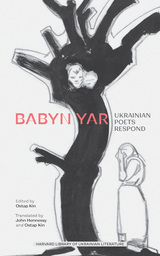
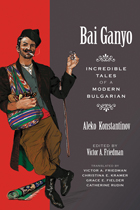
Bai Ganyo has been translated into most European languages, but now Victor Friedman and his fellow translators have finally brought this Balkan masterpiece to English-speaking readers, accompanied by a helpful introduction, glossary, and notes.
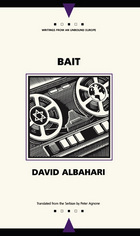
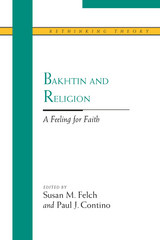
These essays provide an overview of Bakhtin's attitude toward religion in general and Russian Orthodoxy in particular, addressing topics ranging from how Bakhtin's religious ideas informed his linguistic and aesthetic theories to the idea of love in his secular and religious thought and to the religious component of Bakhtin's theory of laughter.
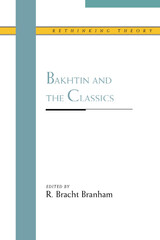
The authors, eminent classicists and distinguished critics of Bakhtin, put Bakhtin into dialogue with the classics--and classicists into dialogue with Bakhtin. Each essay offers a critical account of an important aspect of Bakhtin's thought and examines the value of his approach in the context of literary or cultural history. Beginning with an overview of Bakhtin's notion of carnival laughter, perhaps his central critical concept, the volume explores Bakhtin's thought and writing in relation to Homer's epic verse. Catullus's lyric poetry, ancient Roman novels, and Greek philosophy from Aristotle's theory of narrative to the work of Antiphon the Sophist. The results are of interest and importance to Bakhtinians, theorists, and classicists.
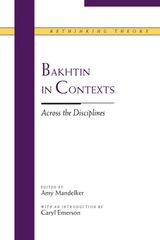
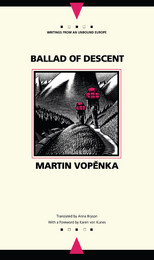
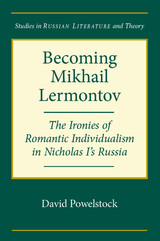
By bringing to light Lermontov's operative version of Romantic individualism, Powelstock is able to make sense of the poet's relationship to "romantic irony," his highly modern concept of the reader (both real, and implied in the text), and his vexed passion for his predecessor Alexander Pushkin--a relationship that is almost always treated sentimentally, but is here given its true competitive edge. Furthermore, Powelstock offers the most persuasive account ever given of Lermontov's exceptionally odd treatment of, and success with, women--both in real life and in fiction--and of his cruel overlapping of these two planes.
Clarifying what has remained perplexing for so long, and correcting what has been misinterpreted, Powelstock's work illuminates Lermontov's views of dignity, death, love, nature, society, and ethics--and, finally, gives us an intellectual biography that is deeper and more subtle than any written before.
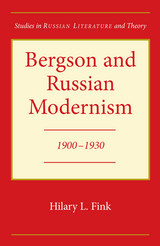
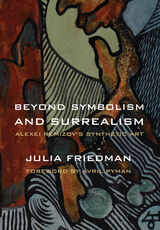
The great modernist eccentric Alexei Remizov was a “writers’ writer” whose innovative poetic prose has long since entered the Russian literary canon. Gradually expanding his working methods to make drawing an integral part of the writing process, during the 1930s and 1940s, Remizov created hundreds of albums that combined texts with collages and india ink and watercolor illustrations. In Beyond Symbolism and Surrealism, Julia Friedman provides the first extensive examination of the dynamic interplay between text and image in Remizov’s albums, revealing their coequal roles in his oneiric and synaesthetic brand of storytelling. A participant in the Russian symbolist movement, an intellectual ally of many futurists, and during his émigré years, a collaborator of the surrealists, Remizov had unique insight into artistic cultures of the European avant-garde. His reinterpretation of the medieval illuminated manuscripts carries forward the traditions of symbolist mysticism and
This long-overdue examination of Remizov’s visual art addresses modernism’s key theoretical questions surrounding the relationships between image and text. Beyond Symbolism and Surrealism introduces a generous sampling of Remizov’s graphic work, much of which is currently held in private collections.
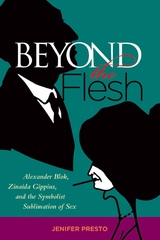
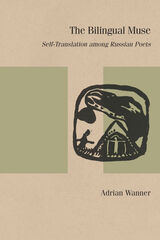
The Bilingual Muse analyzes the work of seven Russian poets who translated their own poems into English, French, German, or Italian. Investigating the parallel versions of self-translated poetic texts by Vladimir Nabokov, Joseph Brodsky, Andrey Gritsman, Katia Kapovich, Marina Tsvetaeva, Wassily Kandinsky, and Elizaveta Kul’man, Adrian Wanner considers how verbal creativity functions in different languages, the conundrum of translation, and the vagaries of bilingual identities.
Wanner argues that the perceived marginality of self-translation stems from a romantic privileging of the mother tongue and the original text. The unprecedented recent dispersion of Russian speakers over three continents has led to the emergence of a new generation of diasporic Russians who provide a more receptive milieu for multilingual creativity.
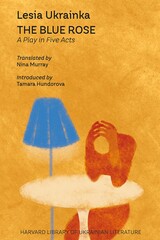
Where is the line that separates the “normal” from the “abnormal”? Liubov, a young Ukrainian woman of small nobility, struggles with this question in Lesia Ukrainka’s The Blue Rose. Living in Ukraine at the turn of the twentieth century, she finds herself outside the norms for a woman: she reads “thick books,” follows music and art, and is interested in science and psychology. She hosts a salon and challenges men in discussions about politics and culture. Liubov is also an orphan whose mother died in an asylum, and she worries about inheriting her mother’s disease as well as passing it on to future children. When Liubov falls in love with Orest, she proposes a radical solution to her dilemma: to pursue something as rare as a blue flower—“pure love” that foregoes the physical and abandons the requirement of marriage and motherhood.
In her commanding debut as a playwright, Ukrainka created a deep psychological rendering of an unattainable ideal. The Blue Rose highlights themes such as women’s struggles for liberation, social progress and its reliance on science, and resistance to change in traditional societies. Written in sophisticated Ukrainian, Ukrainka’s nuanced play helped Ukrainian culture break free of the Russian imperial mold that sought to first provincialize and then erase it. Presented here in contemporary English translation, The Blue Rose illuminates Ukraine’s intellectual history and its connections with Western culture.
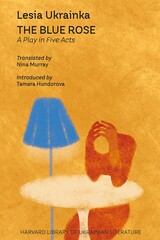
Where is the line that separates the “normal” from the “abnormal”? Liubov, a young Ukrainian woman of small nobility, struggles with this question in Lesia Ukrainka’s The Blue Rose. Living in Ukraine at the turn of the twentieth century, she finds herself outside the norms for a woman: she reads “thick books,” follows music and art, and is interested in science and psychology. She hosts a salon and challenges men in discussions about politics and culture. Liubov is also an orphan whose mother died in an asylum, and she worries about inheriting her mother’s disease as well as passing it on to future children. When Liubov falls in love with Orest, she proposes a radical solution to her dilemma: to pursue something as rare as a blue flower—“pure love” that foregoes the physical and abandons the requirement of marriage and motherhood.
In her commanding debut as a playwright, Ukrainka created a deep psychological rendering of an unattainable ideal. The Blue Rose highlights themes such as women’s struggles for liberation, social progress and its reliance on science, and resistance to change in traditional societies. Written in sophisticated Ukrainian, Ukrainka’s nuanced play helped Ukrainian culture break free of the Russian imperial mold that sought to first provincialize and then erase it. Presented here in contemporary English translation, The Blue Rose illuminates Ukraine’s intellectual history and its connections with Western culture.
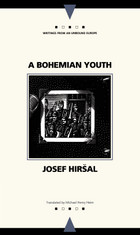
Josef Hiršal's experimental novel is a Dada-like romp through the life of a young man born into a Bohemian peasant family. Told in five parts, A Bohemian Youth begins with a word to the wise, moves on to the text, continues with notes and with notes to the note, and ends with a note on the notes to the notes.
More than just a tongue-in-cheek parody of a literary memoir, A Bohemian Youth is a glimpse of the First Czechoslovak Republic as seen through the eyes of a young peasant from the provinces. Abounding in intimate details--the manners of a servant girl, the habits of the town homosexual, the sounds of popular music; the way people eat in wartime—Hiršal's novel is a wrenching and hilarious tale of a young man's emotional and sexual awakening.
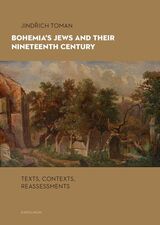
This book on Jewish culture and literature focuses on the “quiet” decades of the nineteenth century, a scarcely written-about period of time in Bohemian Jewish history. Using a myriad of sources, including travelers’ accounts, poems, essays, short stories, guides, and newspaper articles, the volume explores Jewish expression, Jewish-Czech relations, and the changing attitudes toward Jews between the 1820s and 1880s. It offers close readings of writers like Karel Havlíćek Borovský, Ján Kollár, Siegfried Kapper, and Jan Neruda, as well as lesser-known authors and sources. Combining skillful sustained analysis, judicious argumentation, and elegant writing, the book is a truly enriching reading experience.
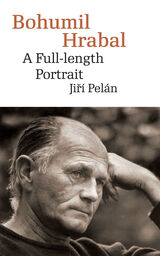
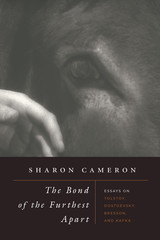
Whether exploring Bresson’s efforts to reassess the limits of human reason and will, Dostoevsky’s subversions of Christian conventions, Tolstoy’s incompatible beliefs about death, or Kafka’s focus on creatures neither human nor animal, Cameron illuminates how the repeated juxtaposition of disparate, even antithetical, phenomena carves out new approaches to defining the essence of being, one where the very nature of fixed categories is brought into question. An innovative look at a classic French auteur and three giants of European literature, The Bond of the Furthest Apart will interest scholars of literature, film, ethics, aesthetics, and anyone drawn to an experimental venture in critical thought.
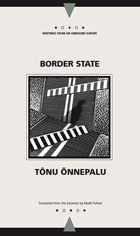
An immediate sensation upon its 1993 publication in Europe, already translated into more than a dozen languages, Border State is a brilliantly realized account of a man in the grip of Western excess, emotionally crippled by a world that is subsuming his own and inhabiting a West in which "all countries have become imaginary deserts of ruins where crowds of nomads roam from one attraction to the other." His tale, in which disillusion and murder become inextricably linked, is a compelling exploration of scarcity, longing, and madness.

Boris Pasternak has generally been regarded as an artist who was indifferent to the literary and political storms of his time. Lazar Fleishman gives the great writer's life a new perspective. He shows that Pasternak's entire literary career should be regarded as a complex and passionate response to constant changes in Russian cultural and social life.
Drawing on a vast array of sources, Fleishman's chronicle encompasses both the familiar and the little-known aspects of the poet's life and work. He describes the formative role played by Pasternak's father, a prominent Russian painter, and the intellectual endeavors of the young man before his literary debut. He explores the intricate relations of Pasternak to the main movements of literary modernism, including symbolism and futurism.
Particularly informative are the chapters devoted to the postrevolutionary years. Fleishman untangles the poet's contacts with leading political figures (Stalin, Trotsky, Bukharin) and fellow writers (Gorky, Mayakovsky, Tsvetaeva, Akhmatova, Mandelshtam), and examines his changes in fortune during the purges and World War II. He shows how Pasternak was perceived by Western contemporaries and how significant their moral support was for him during the darkest years of Stalin's regime. He provides explanations for the Christian themes in Pasternak's later work, as well as the poet's peculiar view of Jewry. Finally, Fleishman recreates the vicissitudes of the publication of Doctor Zhivago and the ensuing Nobel Prize scandal in 1958. A fascinating description of the writer's career in broad context, this book will be welcomed by everyone interested in Pasternak and in twentieth-century literature.
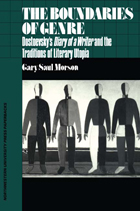

Stanislaw Baranczak, a Polish writer in exile, turns to his colleagues and their plights, in Poland, Czechoslovakia, Hungary, and the Soviet Union, to explain why oppressive regimes could not succeed in their attempts to transform the Eastern European into Homo sovieticus.
These superb essays focus on the role that culture, and particularly literature, has played in keeping the spirit of intellectual independence alive in Eastern and Central Europe. Exploring a variety of issues from censorship to underground poetry, Baranczak shows why, in societies where people struggle to survive under totalitarian rule, art is believed to have the power to make things happen.
He brings into sharp relief the works and personalities of many legendary figures of recent Eastern European political and cultural history from Lech Walesa and Pope John Paul II to Václav Havel and Adam Michnik to Czeslaw Milosz, Witold Gombrowicz, Bruno Schulz, and Joseph Brodsky--and makes vivid the context from which they spring. Some of the essays probe the sense of inarticulateness experienced by writers in exile; many represent the literary essay at its best; all reveal that Baranczak is a sophisticated, often savagely funny writer on whom nothing is lost.
This refreshing and provocative book guides us toward a clearer understanding of what has led to the present moment, in which the nations of Eastern and Central Europe, tired of striving to "breathe under water," are finally "coming up for air." It is rewarding reading for anyone interested in art's confrontation with an intractable political reality--wherever it occurs in the world.
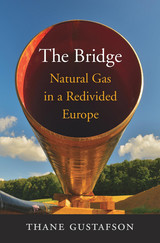
A Marginal Revolution Best Book of the Year
Winner of the Shulman Book Prize
A noted expert on Russian energy argues that despite Europe’s geopolitical rivalries, natural gas and deals based on it unite Europe’s nations in mutual self-interest.
Three decades after the fall of the Berlin Wall and the breakup of the Soviet empire, the West faces a new era of East–West tensions. Any vision of a modern Russia integrated into the world economy and aligned in peaceful partnership with a reunited Europe has abruptly vanished.
Two opposing narratives vie to explain the strategic future of Europe, one geopolitical and one economic, and both center on the same resource: natural gas. In The Bridge, Thane Gustafson, an expert on Russian oil and gas, argues that the political rivalries that capture the lion’s share of media attention must be viewed alongside multiple business interests and differences in economic ideologies. With a dense network of pipelines linking Europe and Russia, natural gas serves as a bridge that unites the region through common interests.
Tracking the economic and political role of natural gas through several countries—Russia and Ukraine, the United Kingdom, Germany, the Netherlands, and Norway—The Bridge details both its history and its likely future. As Gustafson suggests, there are reasons for optimism, but whether the “gas bridge” can ultimately survive mounting geopolitical tensions and environmental challenges remains to be seen.
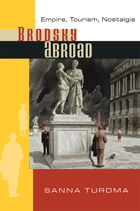
Expelled from the Soviet Union in 1972 and honored with the Nobel Prize fifteen years later, poet Joseph Brodsky in many ways fit the grand tradition of exiled writer. But Brodsky’s years of exile did not render him immobile: though he never returned to his beloved Leningrad, he was free to travel the world and write about it. In Brodsky Abroad, Sanna Turoma discusses Brodsky’s poems and essays about Mexico, Brazil, Turkey, and Venice. Challenging traditional conceptions behind Brodsky’s status as a leading émigré poet and major descendant of Russian and Euro-American modernism, she relocates the analysis of his travel texts in the diverse context of contemporary travel and its critique. Turoma views Brodsky’s travel writing as a response not only to his exile but also to the postmodern and postcolonial landscape that initially shaped the writing of these texts.
In his Latin American encounters, Brodsky exhibits disdain for third-world politics and invokes the elegiac genre to reject Mexico’s postcolonial reality and to ironically embrace the romanticism of an earlier Russian and European imperial age. In an essay on Istanbul he assumes Russia’s ambiguous position between East and West as his own to negotiate a distinct, and controversial, interpretation of Orientalism. And, Venice, the emblematic tourist city, becomes the site for a reinvention of his lyric self as more fluid, hybrid, and cosmopolitan.
Brodsky Abroad reveals the poet’s previously uncharted trajectory from alienated dissident to celebrated man of letters and offers new perspectives on the geopolitical, philosophical, and linguistic premises of his poetic imagination.
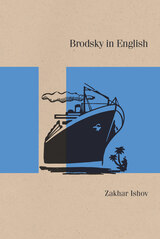
Joseph Brodsky’s translations of his own Russian-language poems into English “new originals” have been criticized for their “un-Englishness,” an appraisal based on a narrow understanding of translation itself. With this radical reassessment of the Nobel Prize winner’s self-translations, Zakhar Ishov proposes a fresh approach to poetry translation and challenges the assumption that poetic form is untranslatable.
Brodsky in English draws on previously unexamined archival materials, including drafts and correspondence with translators and publishers, to trace the arc of Brodsky’s experience with the English language. Ishov shows how Brodsky’s belief in the intellectual continuity between his former life in the Soviet Union and his new career in the United States, including as Poet Laureate, anchored his insistence on maintaining the formal architecture of his poems in translation, locating the transmission of poetic meaning in the rhythms of language itself. This book highlights Brodsky’s place within the long history of the compromises translation must make between linguistic material and poetic process.
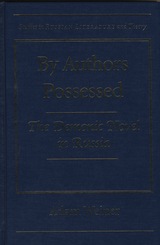
Weiner contends that the theme of demonism increasingly infects the narrative point of view from Gogol's Dead Souls to Dostoevsky's The Devils and Bely's Petersburg, until Nabokov exorcised the demonic novel through his fiction and his criticism. Starting from the premise that artistic creation has always been enshrouded in a haze of moral dilemma and religious doubt, Weiner's study of the demonic novel is an attempt to illuminate the potential ethical perils and aesthetic gains of great art.
READERS
Browse our collection.
PUBLISHERS
See BiblioVault's publisher services.
STUDENT SERVICES
Files for college accessibility offices.
UChicago Accessibility Resources
home | accessibility | search | about | contact us
BiblioVault ® 2001 - 2024
The University of Chicago Press









